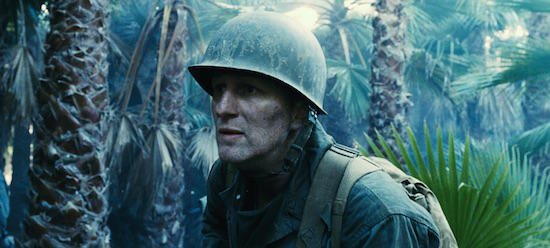
Little Boy (opening in theaters this weekend) tells the story of a small-town kid who wants to do whatever he can to bring his father home from World War II. He explores faith with his minister, gets guidance from an elderly Japanese man who ends up in an internment camp and tries to pick up a few tricks from a traveling magician.
The film has Mark Burnett and Roma Downey as producers and, like their recent faith-based projects like Son of God, it's unapologetically pitched as a family film. The film attracted a strong cast that features Emily Watson, Michael Rapaport, Kevin James and Tom Wilkinson in supporting roles. Director Alejandro Monteverde talked about the movie and the World War II inspirations for his film.
%embed1%
What inspired you to write and direct a movie about small-town America on the home front during World War II?
That’s a pretty complex question. There were a lot of factors, but the main thing was I wanted to tell a story about the underdog. I co-wrote this story with Pepe Portillo. While we were bouncing ideas and we decided to write about the most vulnerable underdog character that we can could up with and ended up with a kid. If you're a child, the challenges that you need to overcome are greater because you're not self-sufficient. We then had to decide the best period to tell this story.
We came across with the illustrator Norman Rockwell. When I saw his illustrations and paintings, he really caught my attention. Since I’m from Mexico I was able to see a very different side to the American culture. I really liked how he was stretching reality, but at the same time there was social commentary. As we explored a lot of the Norman Rockwell illustrations, that led us into the period.

What would be the worst thing that could happen to a child? We decided it was the separation from his father. That led us to World War II. Well, what if he's facing one of the greater wars of all time, which is World War II? What if this kid has another challenge, that he’s a very short kid? That led us to the name, Little Boy.
Well, that name led us to the atomic bomb. It was a domino effect. One thing led to the next and then at one point we realized what we had and the story came together really quickly. It’s a complex story, but we we were able to trace the entire story arc within two days after we realized this was the story of a little boy who wants to bring his father back from World War II. How would you do that?
We start exploring deeper and deeper and found the tone and dancing around the period, the 40's. The patriotism that was going on and all of the elements that come with the home front during World War II.

Since you’re not an American, how did you raise money to make a movie about Americans on the home front in WWII?
That’s a very good question. When we wrote the first script, the movie was budgeted almost at 75 million dollars. We rewrote it and rewrote it until we were able to bring the cost down to around 50 million dollars. Then they told me I only had 25 million dollars to shoot it.
This film has been a challenge all the way from the beginning to the end and the story itself kept giving us the gasoline and the energy that we needed to keep going because we were writing a movie about a kid that was willing to do whatever it takes, trying to achieve the impossible, to be able to bring his father back. What I decided to do is to focus on the story. I knocked on doors, literally investor by investor, and I just told them the story from beginning to end. Investors started connecting with the story, so I started raising $100,000 here, half a million dollar there. We ended up with over 80 investors. It was a quick journey because we were able to raise the entire money in less than one year, but it was a lot of traveling where I was telling the story from the heart.
Many, many times the investors would tell me, “I don’t have the time and I don’t want to invest in films, so you're wasting your time.” I would say, “Just give me ten minutes.” After that time was up, I’d ask, “Would you like to hear more?” and they were hooked. Next thing you know, I was walking out with some money.

Talk about the faith component in your script.
We wanted to explore the power of faith through the eyes of a little boy. What is very interesting about this story is that little boy ends up with two mentors. One is a priest who explains the power and the will of God. Through the other one, Hashimoto, we explore the power and the will of man.
What is beautiful is that this kid is just looking for any power, for any tool, that will bring his father back from World War II. So he's willing to do whatever it takes. Hashimoto tells the kid, that whatever he is going through, it takes courage to believe. That statement explores the power of faith, but it also explores the will of man. They can work hand in hand and complement each other.
You have a kid who wants to explore the power of faith, but he also requires a lot of will in order to take his beliefs into action. I'm always interested in proposing a theme and never imposing a theme. In Little Boy we ask is faith real?
It’s a journey of love between a father and a son about what a son is willing to do. I have three children and I want my children to love me as much as Little Boy loves his father. He was willing to be the clown of the town or to do whatever else it took to bring his father back from World War II.

Before you started researching the film, did you know much about Japanese internment in the U.S. during World War II?
I knew some, but not that much because I went to school in Mexico. When I moved to the United States to attend film school, I didn’t get to take too many history classes. We went to a museum here in Los Angeles that had a lot of history about interment camps and we dived really deep into it and then the character of Hashimoto came to life. He gets released in the film because he was an elder Japanese man and, the longer you lived in the U.S., the more trustworthy you were in the eyes of the government. That was the beauty of this film, that I got to learn a lot of history and I got to learn two sides of the complexity of a war.
We did a screening of Little Boy in Hiroshima and I was very nervous. I was in Hiroshima when I was 18 years old. My two brothers lived in Japan for six years, so I visited Japan a few times. One of the times I went to Hiroshima, but I didn’t know that someday I was going to make this movie. Here I am 10 years, 15 years later, and I was screening a movie called Little Boy at the Hiroshima film festival, filled with Japanese.
I was a little bit concerned about how they were going to react, but there were comments about how they were able to see how much it affected the war, that even though the home front was made up of Americans that didn’t go to war, there was also suffering here in the U.S.

That’s what this movie is about. It's about the home front. It's about how war was also affecting the people that did not go to war. Not only the people that went to fight in the war, but also the ones that stayed here. Family was also participating in the pain and in the suffering and in the sacrifices that a war requires out of Americans. You did not only have to go to war to be very patriotic. It's also the ones that stay here together as a community.
I wish that the patriotism that existed in the 40's existed today. I wish my country had one percent of the patriotism that the United States had during that time. If Mexico had just a little of that, I think we would be a different country.

There has been an amazing array of extremely talented Mexican filmmakers who have come to the United States over the last 15 years. What do you think is responsible for the quality of Mexican films and Mexican filmmakers in the current era?
If you look back, the first golden era in Mexico, in the 1950's, it was like Mexico was the Hollywood of the continent. Right after World War II, we had great filmmakers but they started disappearing because of a lack of opportunity.
In the 80's and 90's there were a small group of filmmakers that included Alejandro González Iñárritu, Alfonso Cuarón and Guillermo del Toro. They moved to the United States to be able to direct the kind of films they wanted to make. I'm very grateful for them because they got the attention here and started opening the doors for the new wave, a new generation of younger filmmakers.
Mexico is full of talent but the opportunity was not there before. Right now, I think the door has opened in Mexico and there are a lot of new filmmakers in Mexico popping up now that the opportunity has presented itself. I don’t think it was a lack of talent before. I just think that it was a lack of opportunity and culture.




